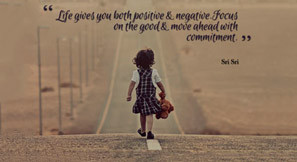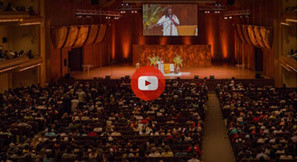Rishikesh, Uttarakhand

Everything that has ever happened till this day, till this very moment, does not exist anymore. Whether pleasant or unpleasant, good or bad. No matter what happened till now, no longer exists. It is all finished.
As we go ahead in life, we will realize that everything is going to end. Nothing will remain. And yet, we still sit and go on thinking over it, worrying about this and that.
Shake everything off yourself, just wake up and see – there is nothing. Everything is nothing, that’s it. This very realization is enough for wisdom to dawn within you.
The nothing that remains is what everything truly is. You need to remind yourself of this again and again, so that it gets instilled in your memory.
After listening to the entire Bhagavad Gita, Arjuna says, 'I remember now'.
What does he remember? That all this is nothing! I am not this. If I was this then I would have ended. I have surpassed all this and moved on, this hasn’t even touched me.
This we must remember again and again.
See, you go to school or college and somebody curses you - hasn’t it happened to you?
In college, there is nobody who hasn’t heard curses from someone, whether friend or enemy. At that moment, we might have felt so heavy, but is that heaviness still present? It is not there, it has passed away. Just see how you have surpassed all that and moved ahead.
So, Everything is Nothing - this is called the Hridaya Sutra (aphorism of heart) as was told by Lord Buddha. This is also what Adi Shankaracharya called as the philosophy of Advaita. All the five elements are nothing. The five senses are nothing. I am nothing. You are nothing.
In the language of the knowledgeable, this translates to, 'All this is nothing'.
Devotees say the same thing in a different way – they say, 'I am akinchan' (I am nothing). If you just understand this, great awareness dawns within you.
So whenever something worries you, awaken yourself. Remind yourself that one day we all have to die. No matter how much you decorate and adorn this body, one day it will burn on the funeral pyre.
See every problem as a challenge. Take it as a challenge and see. Then there is no power in this world that can wipe the smile off your face.
To know this, how many books will you have to read? What all will you do, where will you go? You don’t have to do anything. This is what you are learning - the art of doing nothing!
People have gotten so tired asking again and again, 'What do I do?' And the gurus who keep saying, 'Do this, do that, do this', have grown tired of saying it. So you have to do nothing - just know that all this is nothing.
Now this doesn’t mean you sit and keep chanting this. Then it will become a kind of a disease.
They have caught a new kind of disease overseas - they call it 'affirmations'. Think a particular though within you repeatedly.
In Switzerland, we had a workshop once. And after the workshop we went to a nearby hotel to have some tea and snacks. There, a couple was sitting and they asked me, what do I do. I said that I teach meditation.
I asked them what they do. They said that they practice and teach affirmations.
A husband wakes up at 3am, sits on the bed and says, 'I love myself, I love myself, I love myself' to himself repeatedly. Does one have to do all that to understand such a simple fact?
Our devotees and seekers, who were there at that time, said 'We don’t have to do anything like that. We do Sudarshan Kriya and we automatically feel that ‘I love myself’. We don’t have to say it again and again.'
Now you are here in Rishikesh, do you have to remind yourself that you are in Rishikesh? You know where you are. If you say this repeatedly then sometimes doubt comes. Then one may think, 'Am I really here?' (Laughter)
If you are a man of principles, then what is the problem in meeting someone else? When we are not convinced about our own principles, when we don’t trust ourselves, then we worry that we might lose our principles by shaking hands with someone else!
In other countries, when people greet each other, they greet with one hand, saying, ‘Salaam’, or offer a handshake using the left or right hand. But here in India we greet with both hands and say, ‘Namaste’. It becomes a greeting when both, the left and the right hands join. When the right hand is not so ‘right’ and the left hand is not so ‘left’, then it becomes a greeting (meaning the coming together of two opposites in harmony).
But in other countries, the ‘right’ and the ‘left’ don’t meet at all. They speak ill of each other at a distance.
Even here, the people aligned to the ‘right’ (here referring to the right wing politicians), and the people aligned to the ‘left’ (referring to the Leftist or Communist political parties in India) don’t even meet. Why? It is because they fear that doing so will destroy what they have established so far.
First contemplate upon, 'Who am I?' and then think about me. When you truly realize who you are, then you don’t need to understand anything else, and then you will automatically understand who I am also.
There must have been a similar question in Arjuna’s mind also. But before he could even ask that question to Lord Krishna, the Lord answered, saying 'In whichever way one perceives and worships Me, I reveal myself to them in that very form'.
Why did Lord Krishna say so? Lord Krishna says, 'This is because I am hollow and empty, I am nothing. When I am nothing then whoever sees Me in whichever form that is dear to them, I appear to them in that way'.
Many of our saints have said the same thing. They have said that one should be as simple and easy as water. Just like water takes the form of a vessel in which it is poured, in the same way, our consciousness should also have the same quality.
There is a table with four legs. Even if one leg gets broken, then the table still remains upright by the support of the other three legs, isn't it?
In the same way, in society, if politics (or any other aspect of society) becomes corrupted and loses its effectiveness, then society has to be supported by those aspects which is morally upright.
So, if the social organizations remain silent, or feel dejected and helpless, then it is not good for the society.
See, Nirbhaya died in Delhi (referring to the case of a young girl who was abused and killed in New Delhi). Why did all the social organizations come out in support for her; seeking justice for her? They could have said that it is a criminal case, so it is the duty of police only. What do we have to do with it?
If they would have thought in this way and remained silent about what is going on, then will it be good for our society? No, not at all. need to stand up and intervene sometimes.
In the same way, if there is some wrongdoing in a social organization, then shouldn’t the government intervene? If there is some wrongdoing in the domain of religion, then the government has to intervene, and it does.
A society is a composite community, consisting of many individual entities. We cannot build walls between the different parts of the society. They support and complement each other. This is how it has been since time immemorial.
The great Rishi Vishwamitra used to stay at his ashram. But when there were misdeeds happening in the society, he went to King Dashratha for help, and Lord Rama accompanied him to help restore order and peace. It was their duty to protect Rishi Vishwamitra and set right the elements that were creating a nuisance and disturbing him.
So it is the duty of each part of society to remind the other about its duties and responsibilities. Especially, the good people should come forward and enter politics. If good people just sit back and do nothing, then the wicked elements and criminals get encouragement to create more nuisances in society.










